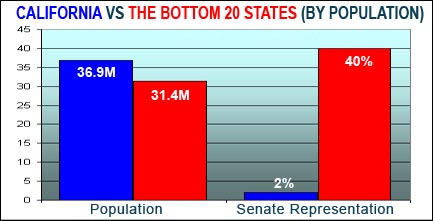This site’s mission has always been to focus on the media and its impact on society and culture. But this morning I was just thinking about how dysfunctional some of our political institutions are, and I thought I’d wander off the reservation for a while.
Friday President Obama had to make recess appointments for 15 nominees to federal posts because Senate Republicans refuse to permit a vote on them. And there are still dozens more in the same state of partisan limbo. In addition to that, Republicans have conducted a record breaking number of filibusters in their attempt to supersede the will of the Senate and the voters.
All of this leads me to question whether the Senate is an anachronism that no longer serves the best interests of democracy. States do not have the sort of parochial concerns that were once a part of the independent and geographically distinct colonies that made up the early confederation. Citizens migrate throughout the nation with little regard to loyalty based on home state affiliation. But the most striking illustration of the Senate having outgrown its usefulness is this chart I drew up:

[Detail breakdown in comments]
What I’d like to know is why do 31.4 million Americans in the twenty smallest states command a 40% share of the votes in the Senate, while 36.9 million Americans in California alone have only 2%? Is that democratic? Have those small-staters done something to deserve so much more influence over the country? Not so far as I can tell. Yet they have a theoretical veto power over the other 276 million citizens in the rest of the nation. That’s just not right.
What this amounts to is that a bunch of states that are mostly inhabited by brush and rodents have an inordinate sway over the laws that govern the vast majority of the country. And it’s often the senators from those small states who are the most obstructionist members of the body.
Maybe it’s time for a change. Maybe senators should represent districts whose lines are determined by population rather than by state boundaries. That would seem to be a much more fair and democratic way of handling this. Personally, I’m pretty tired of watching 10% of the country dictate how the other 90% are going to live.
I know this is not a new question, and there are barriers to any substantive change (mainly because the same small-staters would oppose it in the Senate). But it doesn’t hurt to bring it up from time to time and to hold out some hope that positive, democratic reform might still be possible. Because, in the end, no one should be allowed to be more equal than anyone else in America. No, seriously.


Chart details:
Two Senators per arbitrary geographical borders is as outdated and ridiculous as the electoral college.
Of course, you are correct. This is an old question, one that the founding fathers answered to their own satisfaction at the time by creating the population-based House of Representatives. As there is an answer in place that works for the rest of the Union, perhaps this is actually a problem with California, and not with the other states. Split up CA into reasonable voting districts and your question is resolved without taking any actions that affect the structure of the US government. If CA is so big that it throws off the voting balance, slice it up.
Sure, you could split up California (that would have some other ancillary benefits as well). But you would have to split it into over 70 states to give it parity with Wyoming. That seems a little impractical. Plus it’s not just a California problem. You’d still have to deal with New York and Texas and Illinois, etc. You could end up with 600 states in the union.
It would be much easier to draw fifty federal senatorial districts and add more as the population increases.